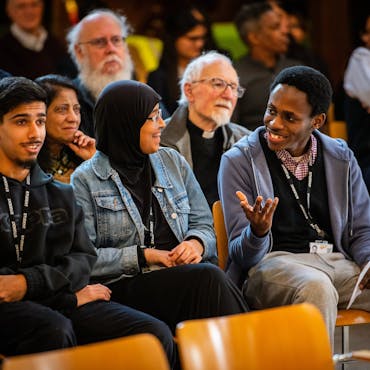Breaking the cycle of homelessness
Homelessness destroys safety, wellbeing, confidence and trust.
We believe that being fully welcomed into relationships with others can significantly reduce this risk. That’s why personal care and community are at the heart of everything we do.
We equip local partners, churches and volunteers to help people facing homelessness develop the skills needed to live independently – now and in the future.
Positive Pathways 2 (PP2)
In 2023 Positive Pathways reached its fifth and final year delivering relational support to people experiencing homelessness across Yorkshire and Middlesbrough. In 2024 Positive Pathways 2 was launched with 5 of its original partners, projects who shared our vision of helping those clients ready to start that next stage in their journey.
The project focuses on moving on, getting clients into housing and helping them stay there. Partners introduced a social enterprise element of the project, offering volunteering opportunities to their clients.
Partners and locations
- Middlesbrough, DePaul Middlesbrough
- Bradford, Hope Housing Sheffield Archer Project (The Cathedral)
- Rotherham, Shiloh
- Doncaster, Complex Lives Team Doncaster Council
Becoming a voice for clients
Kim* was helped by a PP2 partner when she was sleeping rough. She felt she could be open about her experience and the partner linked her into a multi-agency approach. Through that, she managed to get a place in temporary accommodation and benefitted from drop-in sessions, and working one-to-one with a support worker. Kim is now exploring being a volunteer mentor, so she can become a voice for clients, and help them too.
* Name changed to protect privacy
Wayfinder programme: supporting people at risk of homelessness
Wayfinder provides mentorship and structured support for individuals facing homelessness or housing insecurity. Over the past year, it has adapted to meet the increasing complexity of participants’ needs, combining volunteer mentorship with professional support for more effective intervention.
Participants often arrive feeling isolated, unstable, and struggling with mental well-being. Many have struggled to access support elsewhere. By embedding Wayfinder within community hubs, delivery partners have strengthened collaboration with local services, charities, and housing teams, ensuring a holistic approach to both immediate and long-term needs.
Mentors play a key role by offering a listening ear, encouragement, and practical guidance. Participants report feeling respected, understood, and cared for, with the most significant improvements seen in confidence and resilience. Many experience greater stability in their lives, gaining the tools to navigate challenges and rebuild connections.
Key impact and progress
- 92% of participants reported having more supportive people around them.
- 67% saw improvements in emotional well-being.
- 42% improved their long-term housing situation.
- 91% of participants experienced the mentor as helpful.
- 58% of participants had increased self-confidence.
Finding support and meaning
Danny was referred to Wayfinder by a food bank. Living with ADHD and a history of compulsive gambling, he struggled with social isolation and depression. Though previously homeless, he was now living with his partner but was not on the tenancy agreement.
Danny quickly formed a strong connection with his volunteer mentor, who helped him build self-awareness and process past trauma. The ability to share these experiences without judgment was an important step in his journey.
Recognising Danny’s passion for art, Wayfinder provided supplies to encourage his creativity. While he continues to face challenges with gambling, his overall well-being has improved.



